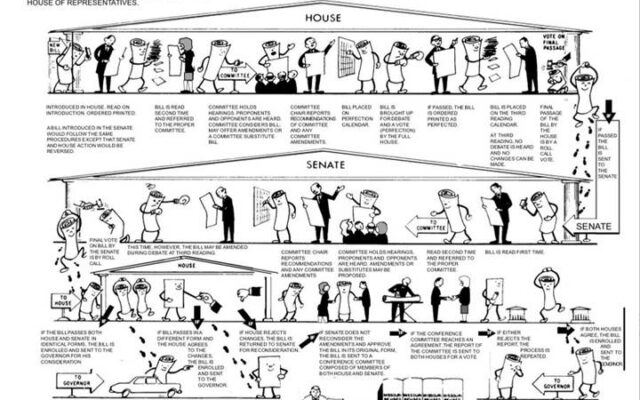THE EGGLESTON REPORT – DEAD BILLS

Sometimes the good things the state legislature does are the bills we pass. But sometimes the best things we do are preventing bad bills from passing. There are several stops a bill has to make along its way to the governor’s desk, and each can act as a filter to weed out bills that are not ready for prime time. Hundreds of bills are filed each session, but usually only dozens pass. The Speaker of the House, the Floor Leader, and committee chairmen can hold a bill if they find it has problems.
One such bill was HB1588, which would have prevented any town from having regulations regarding pit bull dogs. This bill made it to the Rules Committee that I chair, where I have to prioritize which bills make it to the House floor and in what order. I don’t see a problem with a town having dog regulations or not having them, but I don’t think it would be right for Jefferson City to mandate that all towns must or can’t have regulations. Each community should get to decide for itself. The bill would have affected towns that already have pit bull regulations like Bethany, Chillicothe, Mound City, Lathrop, Plattsburg, Savannah, Rock Port, and Maryville. A millionaire animal rights activist came to the capitol and said he would give me a campaign donation for my senate campaign if I would pass that bill or help my opponent if I didn’t pass it. That is completely unethical of course, and I flatly refused. You get to meet all sorts of interesting people when you are a state legislator.
Another bill that started to get traction but was defeated was HB2171. This one would have required every high school senior and their parents to request federal financial college aid in order for the student to graduate high school. This would entail divulging their name, address, social security number, birthday, bank account, and income information, and that info be sent through a chain of people from the high school counselor to who-knows-who in the federal government. This would have been required even if the student had no plans to attend college or would not have qualified for aid, with few exceptions. Colleges already ask incoming students to fill out this form, so requiring it as a high school graduation requirement would be an unnecessary risk of citizens’ personal information, and a headache for high school counselors to administer. I spoke against this bill on the House floor, and thankfully it was defeated. To see the vote tally and how each legislator voted, visit www.tinyurl.com/3b7cem3n.
As always, if you have questions email me at [email protected]. Until next time, health, happiness and prosperity to you and your family.
PICTURES FROM THE DISTRICT

Savannah Fire Department Chief Roraty

It’s not easy to get a bill passed. It’s not supposed to be.
FROM THE CAPITOL NEWS DESK
Missourians Urged to Check for Unclaimed Property
Missourians are once again being encouraged to check for any unclaimed property. The Missouri State Treasurer has launched his annual effort to return unclaimed property to more than 129,400 individuals, small businesses, and non-profit organizations.
The State Treasurer listed the names of Missourians with unclaimed property in more than 100 publications across the state. Missourians can also also search and view the lists by county on ShowMeMoney.com.
“I want to return Unclaimed Property to as many Missourians as possible. We are required by law to run these lists in newspapers, but we are also making them available online so that all Missourians have access to these county lists regardless of their ability to pay for a newspaper,” said the State Treasurer. “I encourage all Missourians to check the Unclaimed Property list and claim any money that is rightfully yours. I also encourage Missourians to take a look at the list and if you see a name you recognize, let that person know. It is always free to claim your Unclaimed Property and many claims can be filed online.”
County lists are accessible at the following link: https://treasurer.mo.gov/UCP/2022-New-Unclaimed-Property-Account-Owner-Lists-by-County.aspx. St. Louis County has the largest list of names with 28,449 names while Worth County has the shortest list with only 30 names.
Most Unclaimed Property consists of cash from bank accounts, stocks, bonds, and contents of safe deposit boxes that have been abandoned. It can also include uncollected insurance policy proceeds, government refunds, utility deposits, and wages from past jobs.
The State Treasurer currently manages over $1 billion in unclaimed assets in more than five million owner accounts. One in ten Missourians has Unclaimed Property, and the average return is nearly $300.
Missourians Warned About Messaging Scams
The Missouri Department of Labor and Industrial Relations is warning individuals about potential messaging scams involving Missouri’s unemployment program. The department is advising Missourians to be wary of suspicious email or text messages, as well as any links they contain. Text messages from the department will never include links.
The scams often involve email or text messages attempting to acquire personal information from individuals to gain access to funds or commit identity theft. Phishing messages often ask for personal information such as social security number, birthdate, PIN number, or other data. These messages may appear to have been sent by the Missouri Department of Labor, the Division of Employment Security, a banking institution or other entity.
Anyone unsure if a message about Missouri’s unemployment program is legitimate is encouraged to contact the department for verification. Individuals may speak to a representative by calling 800-320-2519. They can also submit a request online at https://laboranswers.mo.gov/hc/en-us/requests/new.
Missourians Can Track Use of Federal Funds on State’s ARPA Website
The state operating budget approved by the Missouri General Assembly was recently signed into law and now Missourians can track the use of federal funds allocated under the plan. Gov. Mike Parson announced the State’s American Rescue Plan Act (ARPA) website now includes information on several new grant programs that were signed into law, as well as a detailed overview of all planned uses of ARPA State Fiscal Recovery Funds as provided for in HB 3020.
The website first launched in May with limited information about water, wastewater, stormwater, and lead service line inventory grant programs. Several more grant programs will begin accepting applications in the coming weeks. New grant programs include those for agriculture innovation and workforce development, private MoExcels projects, workforce training, and broadband infrastructure. The remaining grant programs will begin accepting applications over the next couple of months.
The General Assembly also added five new grant programs with the passage of HB 3020. The new programs include grants to port authorities ($25M), grants to local county law enforcement and county prosecutors ($1M), grants to innovative projects to promote agriculture in urban/suburban communities ($50k), Missouri Agricultural and Small Business Development Authority biofuel grants ($4M), and county jail improvement grants ($10M). Additional information on these grant programs, including application timeframes, will be added to the website in the coming weeks as program details are developed.
Gov. Parson said, “With this historic funding, we owe it to the people of Missouri to make sure it will be used strictly for the purpose of serving all Missourians effectively. These grants have the potential to set our people, infrastructure, and workforce development up for the future. People will be able to follow along throughout the process by accessing our website, which is a transparent one-stop shop to view our spending efforts and ensure these funds are being used most appropriately.”
ARPA and associated federal regulations outline specific categories of allowable spending for the ARPA State and Local Fiscal Recovery Funds. The eligible categories of spending include projects or programs that support public health expenditures; address negative economic impacts caused by COVID-19; replace lost public sector revenue; or invest in water, sewer, and broadband infrastructure.
The state’s website for ARPA funding information and opportunities can be viewed at the following link: https://moarpa.mo.gov/.



